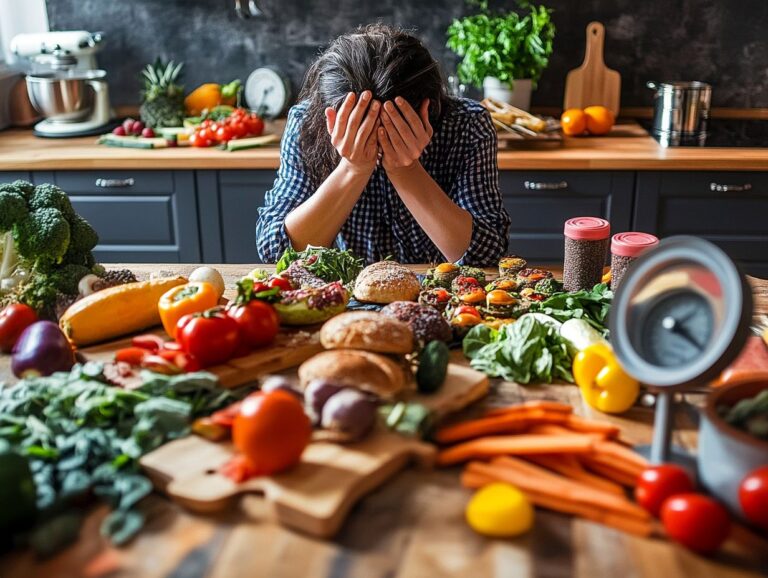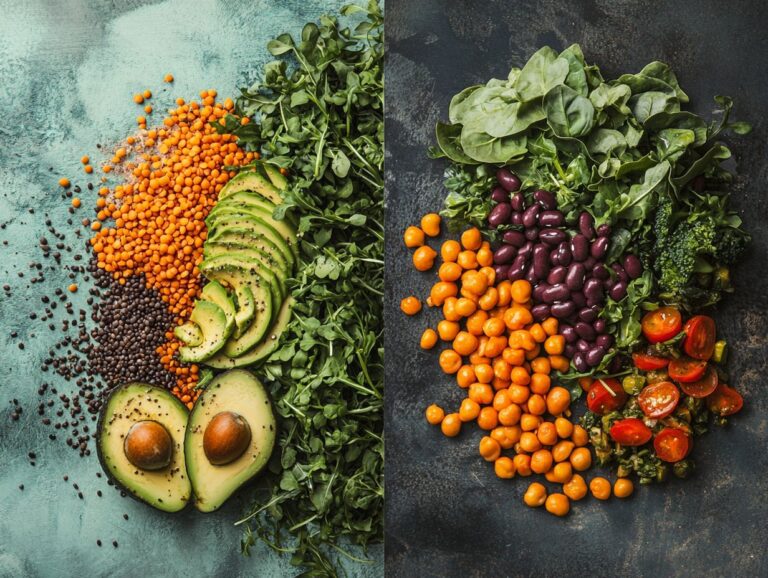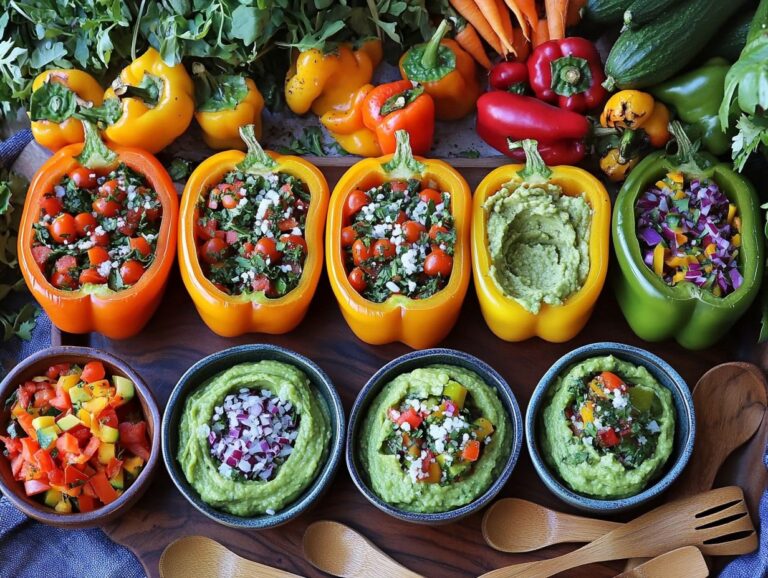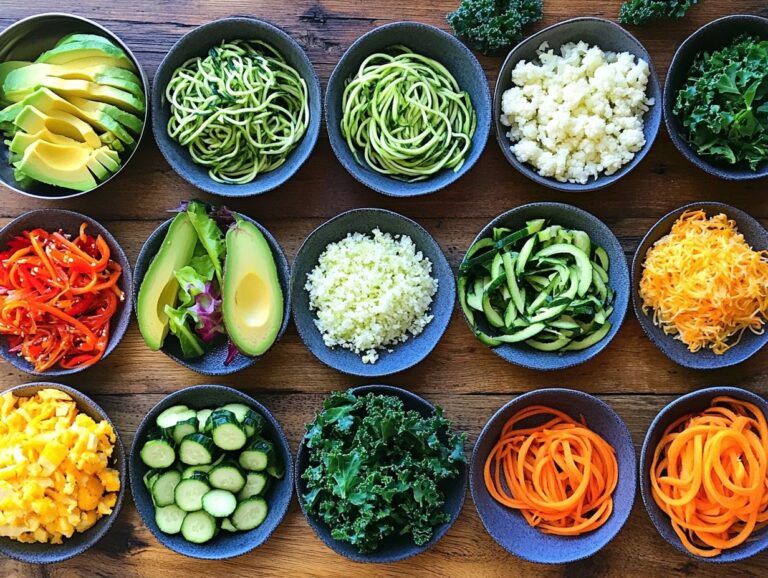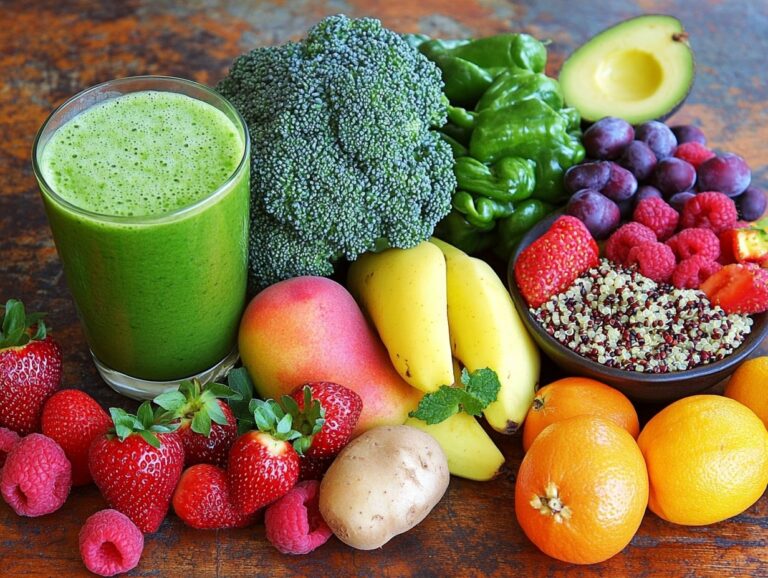Are you looking for a way to support your kidney health while enjoying delicious plant-based meals and trying Meatless Monday?
A vegan renal diet might be the perfect solution. This approach focuses on incorporating high-quality plant proteins, low-phosphorus fruits and vegetables, and healthy fats, while avoiding certain high-phosphorus and high-potassium foods. It also includes guidance from dietitian advice for better renal health.
Explore what a vegan renal diet entails, its importance for kidney health, and discover some mouthwatering recipes that will make healthy eating enjoyable. Nourish your body and support your kidneys! From salads like grilled romaine salad to refreshing summer drinks, the options are endless.
What Is a Vegan Renal Diet?
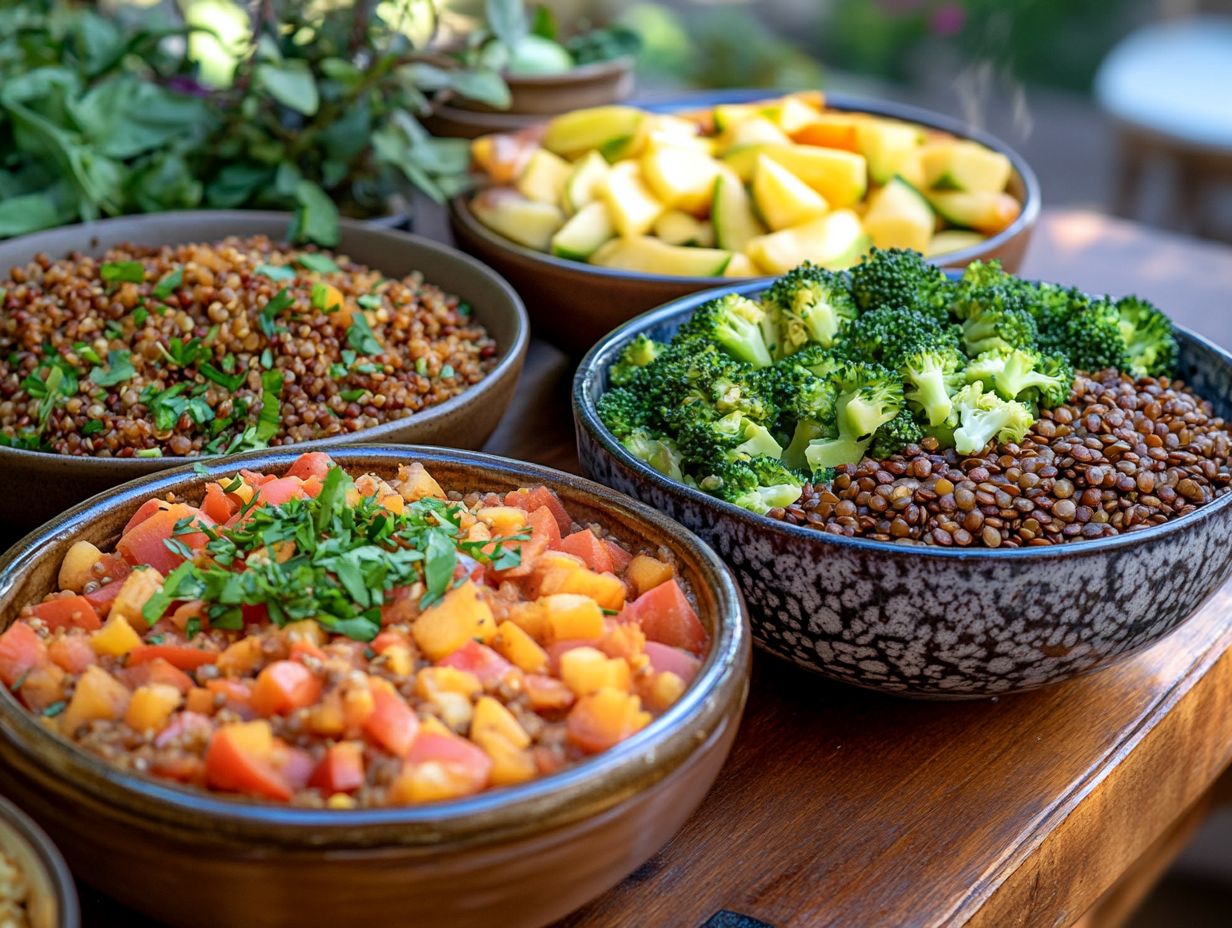
A vegan renal diet is a specialized dietary plan designed to maintain kidney health while adhering to plant-based principles. This diet emphasizes the consumption of whole, nutrient-dense foods that are low in phosphorus and potassium, making it particularly beneficial for individuals managing Chronic Kidney Disease (CKD).
It focuses on incorporating high-quality plant proteins and avoiding harmful substances to promote renal health, while also meeting essential protein goals for overall well-being. Additionally, the diet features a variety of delicious and nutritious vegetarian recipes, making healthy eating both enjoyable and sustainable.
Why Is It Important for Kidney Health?
Maintaining kidney health is crucial for individuals at risk of Chronic Kidney Disease (CKD), as a carefully managed vegan renal diet can enhance renal function and overall well-being.
Plant-based diets play a significant role in managing CKD by reducing the intake of saturated fats and cholesterol, which can exacerbate kidney issues. A renal diet primarily consists of whole grains, legumes, fruits, and vegetables, and incorporates plant-based foods like mushrooms and soy milk.
These foods are rich in nutrients that promote kidney health and contain naturally occurring compounds that help lower blood pressure and blood sugar levels. This, in turn, reduces the accumulation of waste products that the kidneys struggle to filter, lightening their workload.
Additionally, the antioxidants found in plant-based foods can bolster the body’s defense system, thereby increasing longevity and improving the quality of life for those with potential renal function concerns. For better results, try detox recipes recommended by dietitian advice.
What Foods Should Be Included in a Vegan Renal Diet?
In addition to focusing on kidney-friendly recipes, include options from The Kidney Kitchen and consider advice from experts like DaVita.
A vegan renal diet emphasizes high-quality plant proteins, low-phosphorus fruits and vegetables, whole grains, and healthy fats. This diet includes a variety of foods such as:
- Lentils: Lentils are an excellent source of high-quality plant protein, fiber, and essential vitamins and minerals.
- Quinoa: Quinoa serves as a complete protein, providing all essential amino acids, making it a valuable addition to a vegan renal diet.
- Vegetables: Incorporating a variety of low-phosphorus vegetables, such as cucumbers, lettuce, carrots, and bell peppers, is important for their vitamins, minerals, and antioxidants.
- Fruits: Low-phosphorus fruits like apples, berries, watermelon, and grapes offer natural sweetness along with essential nutrients.
- Whole Grains: Whole grains such as brown rice, oats, and barley are good sources of fiber and provide complex carbohydrates for energy.
- Healthy Fats: Including sources of healthy fats like avocados, nuts, and seeds can help supply essential fatty acids and promote overall health.
Kidney-friendly recipes that feature these foods can help ensure that individuals following a vegan renal diet receive the necessary nutrients while supporting their kidney health. Try out delicious options like mushroom croquettes and spring onion frittata.
1. High-quality Plant Proteins
Including high-quality plant proteins in your meals, such as those found in vegetarian recipes from trusted sources, can greatly benefit your health.
High-quality plant proteins are an essential component of a vegan renal diet, as they provide vital nutrients for a well-balanced diet without the increased phosphorus load associated with animal proteins. These proteins support overall body functions while helping to maintain optimal kidney health.
Legumes, such as lentils and chickpeas, are rich in fiber and low in fat, promoting satiety and preventing excess strain on the kidneys. Tofu, a high-protein, low-fat food made from soybeans, can be used in a variety of dishes, including stir-fries, salads, and smoothies.
Quinoa is a complete protein that contains all the essential amino acids and serves as a nutritious base for grain bowls with kidney-friendly vegetables and other ingredients.
By creatively incorporating these plant protein sources into meals, individuals can enjoy delicious dishes while prioritizing their kidney health. Consider adding a protein goals chart to your meal planning for better management.
2. Low-phosphorus Fruits and Vegetables
Incorporating low-phosphorus fruits and vegetables into a vegan renal diet is essential for maintaining kidney health and providing necessary nutrients. These foods not only supply important vitamins and minerals but also help control phosphorus levels, which is crucial for individuals with kidney issues.
Apples, berries, and grapes are examples of low-phosphorus fruits that offer numerous antioxidants and dietary fibers.
Low-phosphorus vegetables, such as cucumbers, cauliflower, and bell peppers, can easily be included in a variety of meals, delivering vitamins A and C without the higher phosphorus content found in other options.
Creating refreshing salads with these ingredients or blending them into smoothies are just a couple of examples of delicious and nutrient-rich meals that support kidney health while adhering to dietary restrictions. Try a strawberry-pineapple smoothie or a couscous salad with these low-phosphorus ingredients.
3. Whole Grains and Healthy Fats
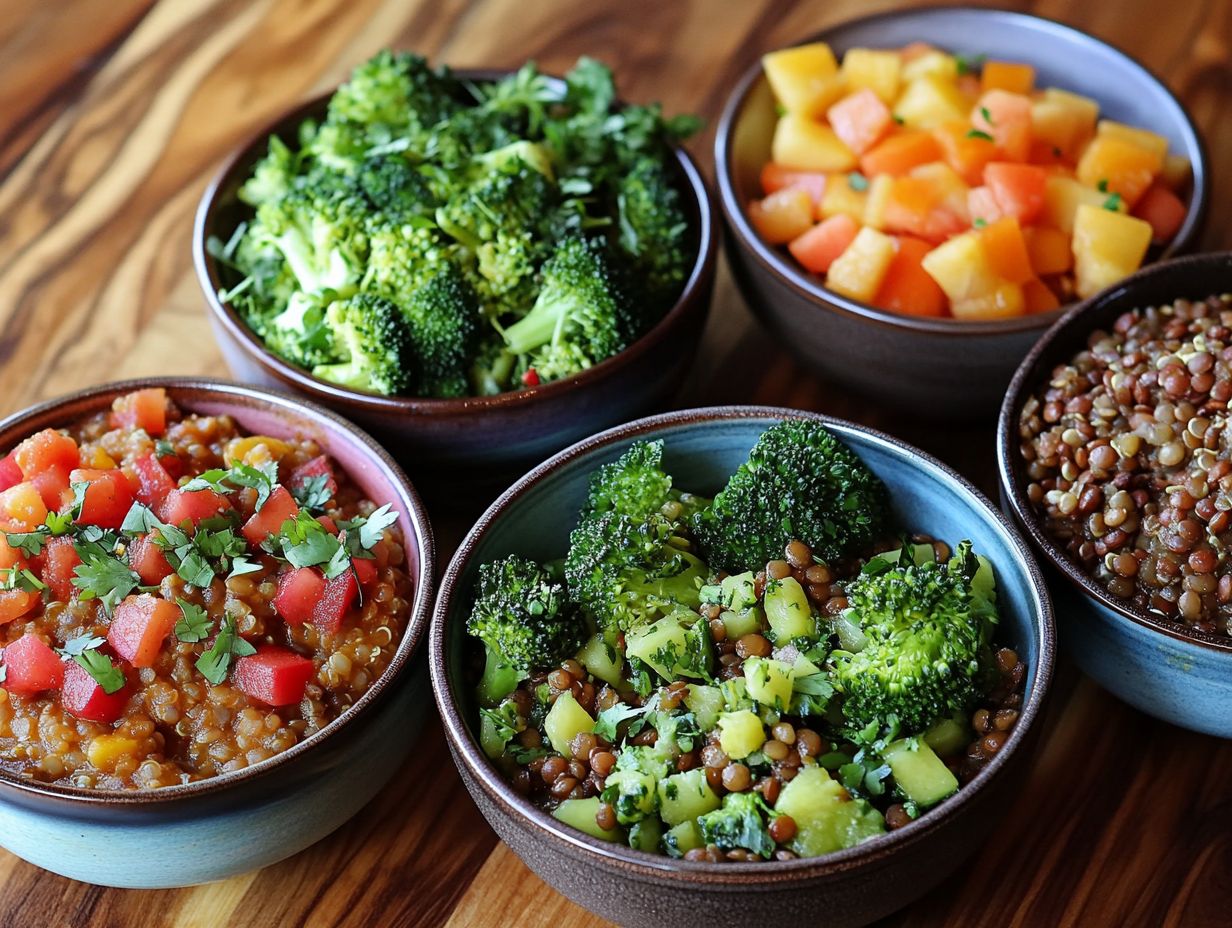
Whole grains and healthy fats are essential components of a vegan renal diet, enhancing its nutritional balance while ensuring that plant-based ingredients remain kidney-friendly.
Examples of healthy grains, such as quinoa and brown rice, provide fiber and protein, which support kidney function. Healthy fats found in olive oil and avocado are crucial for heart health, making their inclusion vital in a well-rounded diet.
One example of a vegan renal diet-friendly meal is a quinoa salad made with olive oil, diced avocado, cherry tomatoes, and a splash of lemon juice. Another comforting option is a warm brown rice bowl topped with steamed vegetables and avocado dressing, which promotes overall health while being gentle on the kidneys. Additionally, include healthy smoothie options in your diet for a refreshing change.
4. Limited Sodium and Potassium
Sodium and potassium restrictions are crucial for patients on a vegan renal diet, especially those with Chronic Kidney Disease (CKD). Excessive sodium intake can worsen kidney function and lead to complications such as fluid overload and hypertension. Similarly, high potassium levels can cause hyperkalemia, which may result in arrhythmias and other cardiovascular issues.
When the kidneys are unable to filter out these substances effectively, it can disrupt their balance and adversely impact the body’s overall function.
To help lower sodium levels, patients should:
- Avoid processed foods,
- Carefully read the labels on packaged items,
- Use herbs and spices, such as garlic and asparagus, to flavor their meals instead of salt.
To reduce potassium levels, patients should opt for lower-potassium fruits and vegetables, such as apples and lettuce.
What Foods Should Be Avoided in a Vegan Renal Diet?
A vegan renal diet should exclude foods that are detrimental to kidney health and may exacerbate conditions such as Chronic Kidney Disease (CKD).
1. High-phosphorus Foods
In a vegan renal diet, it is essential to restrict high-phosphorus foods to protect kidney function and overall health. This is particularly important because excessive phosphorus can lead to various health issues, including weakened bones and cardiovascular complications, especially for individuals already facing kidney challenges.
While foods such as beans, nuts, seeds, and certain whole grains are nutritious in many respects, they can also contribute to elevated phosphorus levels. To maintain a balanced diet while keeping phosphorus intake in check, individuals can choose alternatives that are rich in nutrients but low in phosphorus.
For example, incorporating fruits and vegetables like apples, berries, watermelon cucumber salad, and zucchini, along with low-phosphorus grains such as white rice or quinoa, helps meet nutritional needs without placing additional strain on the kidneys.
2. High-potassium Foods
Avoiding high-potassium foods is essential in a vegan renal diet, particularly for individuals with impaired kidney function. High potassium levels can pose serious health risks, especially concerning heart health.
To reduce potassium intake, it is important to recognize that certain foods are particularly high in potassium and are typically excluded from a renal diet. Foods such as:
- bananas
- sweet potatoes
- spinach
- pomegranate
are high in potassium and should often be avoided. Instead, individuals can incorporate lower-potassium vegetables, such as carrots and green beans, or opt for grains like white rice.
Additionally, appropriate portion sizes and specific cooking methods can help reduce potassium levels in a renal diet. With careful planning, it is possible to include a variety of vegan foods while still protecting kidney health.
3. Processed and Packaged Foods
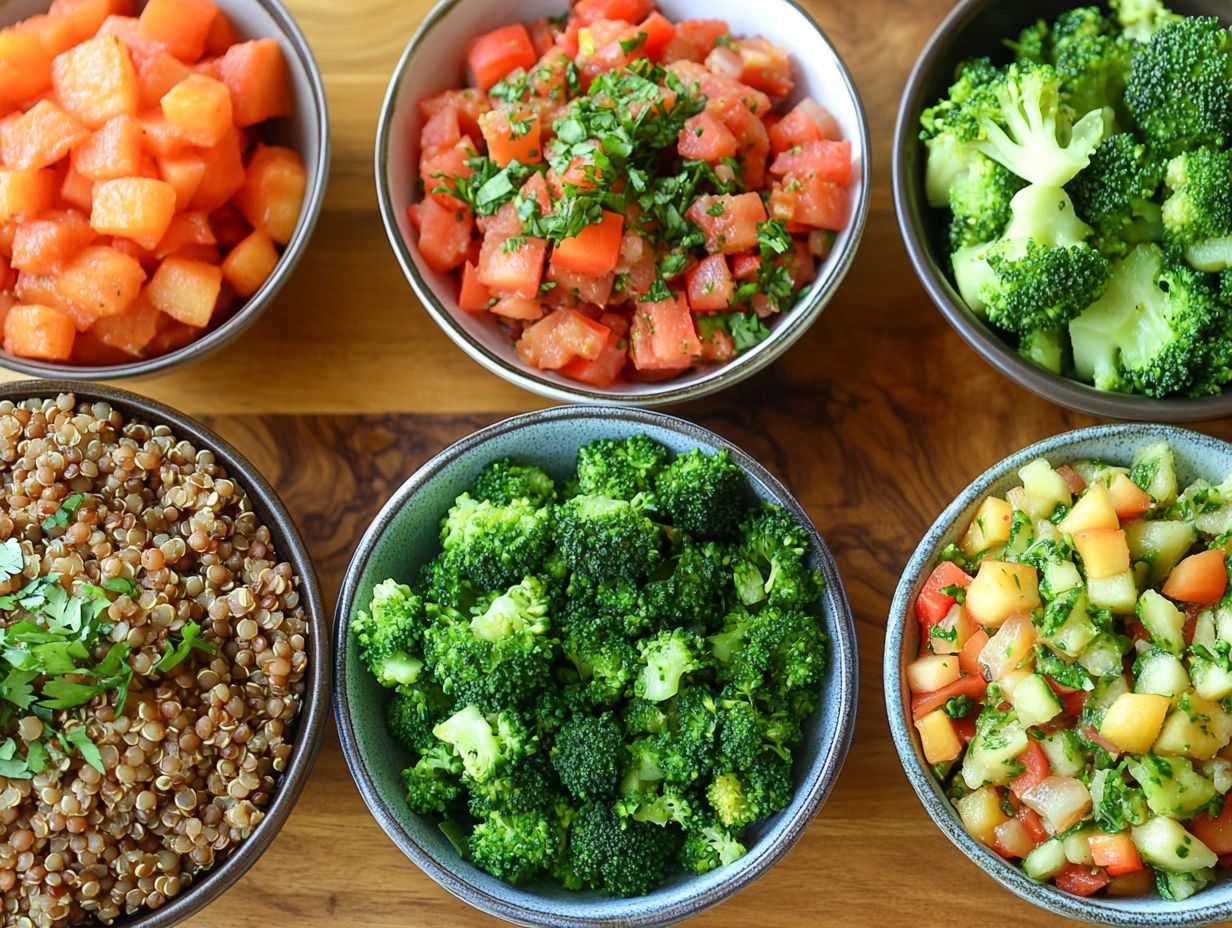
Processed and packaged foods that are high in sodium and unhealthy additives are unsuitable for a vegan renal diet. This poses a significant concern for individuals with kidney disease, as elevated sodium levels can increase blood pressure and progressively worsen kidney function over time. Avoiding these foods and opting for homemade meals, such as those shared by The Kidney Kitchen and other reliable sources, can help manage Chronic Kidney Disease (CKD) more effectively.
Many of these processed foods are not only low in essential nutrients but also high in unhealthy fats and sugars, potentially leading to other health problems. Instead, individuals who aim to maintain optimal kidney health should focus on consuming nourishing whole foods, such as fresh fruits, vegetables, legumes, and whole grains.
What Are Some Delicious Vegan Renal Diet Recipes for Meatless Monday?
Preparing delicious meals that adhere to a vegan renal diet can be both satisfying and nutritious, enabling individuals to savor a variety of flavors while promoting kidney health.
1. Lentil and Vegetable Soup with Swiss Cheese
Lentil and vegetable soup with a touch of Swiss cheese is a hearty and flavorful option that fits perfectly into a vegan renal diet, providing essential nutrients without compromising kidney health.
This nourishing dish combines protein-packed lentils with a colorful medley of vegetables, such as carrots, celery, and spinach, all simmered in a rich vegetable broth.
To prepare the soup, simply sauté chopped onions and garlic, then add the lentils and diced vegetables, followed by the broth and seasonings. As this comforting meal simmers, it releases a delightful aroma that invites everyone to the table.
Rich in fiber and low in sodium, the soup supports kidney function while offering a warm, satisfying meal that is both delicious and incredibly nutritious.
2. Quinoa and Black Bean Salad
Quinoa and black bean salad is a protein-packed, nutrient-rich dish that is ideal for a vegan renal diet. This vibrant salad not only offers a delightful blend of flavors and textures but is also easy to prepare, making it a convenient option for busy lifestyles.
Rich in essential vitamins, minerals, and fiber, it is an excellent choice for anyone looking to enhance their overall well-being, especially individuals with kidney concerns. The combination of fluffy quinoa and hearty black beans provides a balanced intake of amino acids, while the added vegetables contribute a variety of antioxidants.
With a simple dressing of olive oil and lime juice, this salad is both refreshing and satisfying, supporting nutritional goals without excessive sodium or harmful additives.
3. Baked Tofu and Vegetable Stir-fry
A baked tofu and vegetable stir-fry is a quick and delicious vegan meal that is kidney-friendly, making it an excellent choice for those following a renal diet. This dish combines protein-rich tofu with a variety of colorful vegetables, providing a rich source of vitamins and minerals while minimizing sodium and phosphorus intake.
Key ingredients include firm tofu, zucchini, bell peppers, and broccoli, which not only add vibrant flavors but also essential nutrients beneficial for overall health.
To prepare this dish, simply marinate the tofu in a mixture of low-sodium soy sauce and ginger, then bake it until golden. Toss the tofu with the vegetables in a hot pan for a few minutes, allowing them to retain their crunch and vibrant colors.
This wholesome meal not only promotes kidney health but also satisfies the taste buds, showcasing that nutritious eating can be both delicious and gratifying.
4. Sweet Potato and Black Bean Chili with Almond Milk
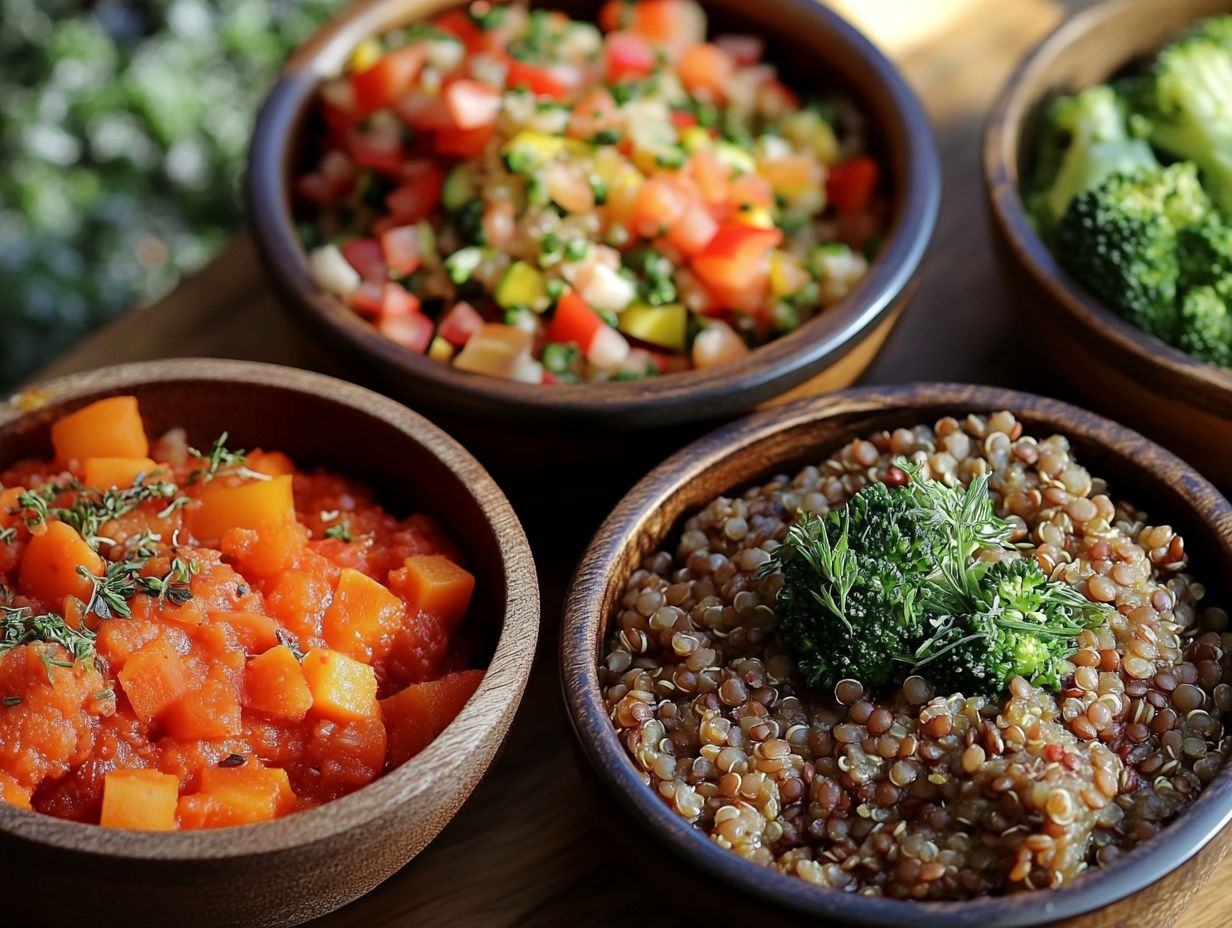
Sweet Potato and Black Bean Chili with Almond Milk is a healthy and delicious option that is suitable for a vegan renal diet, offering both fiber and essential micronutrients.
The antioxidants and vitamins found in sweet potatoes and black beans may help in preventing kidney disease. Additionally, the plant-based protein from these ingredients serves as a good alternative for those who need to limit meat consumption.
The high fiber content can aid in regulating blood sugar levels, which is crucial for overall health, particularly for individuals with kidney disease.
Moreover, cumin and chili powder are both rich in antioxidants, so adding them in moderation can enhance the flavor and nutritional value of the recipe.
5. Brown Rice and Vegetable Sushi Rolls
Brown rice and vegetable sushi rolls offer a fun and creative way to enjoy a vegan renal diet while incorporating healthy foods. These sushi rolls not only tantalize the taste buds but also serve as a nourishing option for those focused on kidney health.
By using brown rice instead of traditional white rice, the rolls provide additional fiber and nutrients, which can be beneficial for overall wellness. The vibrant, fresh vegetables—such as cucumber, bell pepper, and avocado—add crunch and essential vitamins without overwhelming the renal system.
Preparing these sushi rolls at home allows for easy customization, ensuring that all ingredients are fresh and low in sodium, making them an excellent choice for anyone seeking a kidney-friendly meal.
6. Chickpea and Vegetable Curry
Chickpea and vegetable curry is a delicious and satisfying dish that is both flavorful and aligns with the principles of a vegan renal diet.
This curry combines the hearty texture of chickpeas, which are an excellent source of plant-based protein and fiber, with a variety of colorful vegetables, including spinach, bell peppers, and carrots.
The addition of spices such as cumin, turmeric, and coriander not only enhances the flavor but also offers anti-inflammatory properties that contribute to overall health.
To prepare the curry, vegetables are sautéed until tender, after which pre-cooked chickpeas are added and simmered in a mixture of coconut milk and spices.
This nutritious meal provides a delightful taste experience while adhering to kidney-friendly eating guidelines.
How Can a Vegan Renal Diet Help with Kidney Health and Manage CKD?
A vegan renal diet is a dietary plan that focuses on plant-based foods to enhance kidney health, manage CKD, and alleviate symptoms of chronic kidney disease.
This approach provides essential nutrients while limiting harmful substances. By emphasizing whole, plant-based foods that are low in phosphorus and potassium, vegan renal diets promote a healthy lifestyle that can support kidney function and reduce CKD symptoms.
1. Reduces Risk of Chronic Kidney Disease and Supports a Kidney Diet
A vegan renal diet can reduce the risk of Chronic Kidney Disease (CKD) by promoting good nutrient intake while limiting harmful substances. This dietary approach emphasizes plant-based foods that are rich in fiber, vitamins, and antioxidants, all of which contribute to optimal kidney health.
Incorporating a variety of colorful fruits, vegetables, whole grains, and legumes into the diet helps ensure adequate hydration and potassium levels, both essential for maintaining healthy kidneys. Additionally, a vegan renal diet typically limits saturated fats and cholesterol, which have been associated with kidney strain.
When combined with regular exercise and proper hydration, this dietary approach further enhances its protective effects, underscoring the importance of healthy eating habits in preventing CKD.
2. Manages Symptoms of Kidney Disease
A well-planned vegan renal diet is essential for managing the symptoms of kidney disease and can significantly improve quality of life.
This type of diet emphasizes plant-based, low-phosphorus, and low-potassium foods, enabling patients to make kidney-supportive dietary choices.
Recommended foods include:
- Fresh fruits and vegetables
- Whole grains
- Low-protein legumes
While processed foods high in sodium should be avoided. It is crucial to carefully balance nutrient intake to ensure adequate protein sources while limiting excess amounts that could place additional stress on the kidneys.
Seeking guidance from a healthcare provider or dietitian, such as resources available from DaVita or The Kidney Kitchen, can provide individualized support and recommendations to create a diet that promotes health and well-being while effectively addressing the challenges of kidney disease.
3. Promotes Overall Health and Well-being
Balanced nutrition plays a vital role in enhancing overall health and well-being, similar to the benefits of a vegetarian diet. It promotes the consumption of plant-based foods that are rich in essential vitamins, minerals, and antioxidants, which can help reduce inflammation and oxidative stress in the body.
By emphasizing fruits, vegetables, whole grains, and legumes, this approach minimizes the intake of harmful saturated fats and cholesterol commonly found in animal products while increasing dietary fiber. As a result, it can improve digestive health and cardiovascular function, while also decreasing the risk of chronic diseases such as diabetes and hypertension. Additionally, incorporating smoothie recipes into the diet can provide a refreshing and nutrient-dense option for those on a kidney diet.
Tips for Following a Vegan Renal Diet: Healthy Recipes for June 11, 2024
A vegan renal diet is a strictly plant-based eating plan designed to treat renal disease. This diet must be carefully tailored to meet an individual’s specific nutritional needs while also promoting kidney health.
